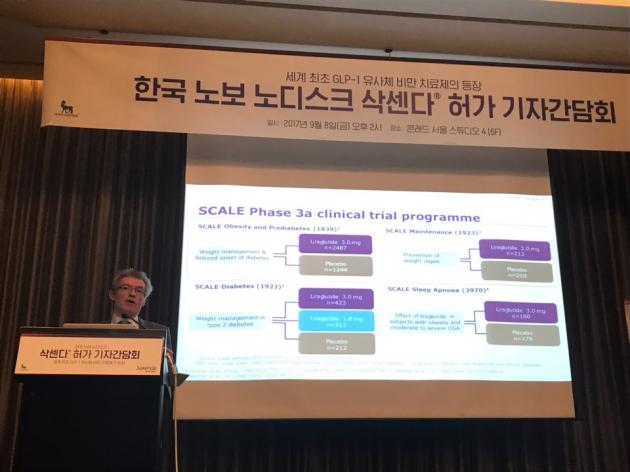Novo Nordisk Korea raised some eyebrows ahead of launching its obesity drug Saxenda in the domestic market, immediately after the U.S. Department of Justice punished its U.S. sales force for employing improper marketing practices.
The Korean offshoot of the Danish pharmaceutical company opened its Saxenda conference to Korean reporters on Sept. 8 to promote and explain the drug’s efficacy in treating obesity. The drug is to be launched next March, Novo Korea’s marketing agency said.
“There are very few medicines proven to treat obesity with FDA or EMA stamps. In Korea, few drugs are registered to treat obesity. Now we are delighted to bring a very innovative treatment to Korea,” said Rana Azfar Zafar, general manager of Novo Nordisk Korea한국노보노디스크.
The controversy began in the process of explaining the drug’s possible side effects.

Saxenda contains the ingredient liraglutide, which is the same as Novo’s blockbuster diabetes drug Victoza. According to the U.S. Food and Drug Administration (FDA) and Korea’s Ministry of Food and Drug Safety (MFDS), liraglutide caused thyroid C-cell tumors, including medullary thyroid carcinoma (MTC), in rats and mice in clinical trials, depending on dosage.
Before the U.S. launch, the FDA mandated Novo Nordisk to place a warning label on Victoza regarding the clinical trial findings to state that it is unknown whether the results apply to humans.
The Saxenda homepage complies with FDA regulations. “Serious side effects may happen in people who take Saxenda®, including: Possible thyroid tumors, including cancer. In studies with rats and mice, Saxenda® and medicines that work like Saxenda® caused thyroid tumors, including thyroid cancer. It is not known if Saxenda® will cause thyroid tumors or a type of thyroid cancer called medullary thyroid carcinoma (MTC) in people.”
However, at the Korean press conference held about two weeks ago, Novo Nordisk Korea officials and a guest presenter denied the possibility of thyroid cancer in humans.
“The information of thyroid cancer came up years ago in the initial development of the liraglutide Victoza for people with diabetes because it was shown, in animal models, the thyroid contains GLP-1 receptors. By stimulating these receptors in the thyroid, it could give thyroid cancer in animals,” Professor Luc Van Gaal said. “In humans, on the contrary, the thyroid does not contain these receptors. So we have not observed that same phenomenon [in humans] that we have seen in animal research.”
When asked to confirm, he restated that “the possibility of thyroid cancer does not exist in humans” and that “thyroid cancer is no longer an issue.”
Novo Nordisk Korea officials agreed: “[Professor Luc Van Gaal] based his remarks on clinical trial findings. Because we are looking at the same data, we do not have a differing stance.”
The remarks from the Korean branch came just two days after the U.S. Department of Justice (DoJ) levied a $58.65 million settlement onto the Danish pharmaceutical giant for downplaying the cancer risk associated with Victoza in the U.S.
According to the DoJ, Novo Nordisk agreed to pay the settlement to resolve the probe into the company’s alleged illegal marketing practices. The company had been found to downplay Victoza warnings and mislead doctors through a variety of illicit means, according to court filings.
The “United States, et al. ex rel. Kennedy, v. Novo A/S, et al.” civil lawsuit filing states the company’s U.S. sales force failed to warn doctors of the diabetes drug’s side effects, saying “the potential risk of MTC associated with Victoza is only applicable to rats and mice… [and] because of differences between rodents and humans, it is implausible that people would contract MTC from the use of Victoza.”
The U.S. DoJ penalized the Danish pharmaceutical giant for violating the Federal Food, Drug, and Cosmetic Act from 2010 to 2012.
While the company said it takes the responsibility of communicating the safety and clinical benefit of their medicines in a statement seriously, it did not acknowledge any wrongdoing.
"While we do not agree with the U.S. government’s legal conclusions and deny any wrongdoing, we’re pleased to have negotiated a resolution that allows the company to return its full attention to developing medicines that help improve the lives of patients,” said Doug Langa, head of Novo Nordisk North America operations.
Meanwhile, Novo Nordisk Korea’s marketing agency stated that it did not receive further instruction or education regarding the U.S. civil suit.
In a statement sent to Korea Biomedical Review Saturday, the FDA explained that while it could not speculate about any potential claims, it confirmed that it was not possible to establish or exclude the possibility of liraglutide causing MTC in humans.
“Victoza and Saxenda are two tradenames for the same active ingredient, liraglutide. Because the active ingredient is the same, the animal studies that supported the approval of Victoza also supported the approval of Saxenda,” the U.S. regulatory body said.
“In rats and mice, liraglutide causes dose-dependent thyroid C-cell tumors. Cases of MTC in patients treated with liraglutide have been reported in the postmarketing period; the data in these reports are insufficient to establish or exclude a causal relationship between MTC and liraglutide use in humans,” it added.
Regarding the cancer risk, a Novo Nordisk Korea official considered it a “non-issue” saying that “if it were a dangerous drug, then patients from all over the world would report the issue, leading to an update.”
It’s not one of major concern, the official added.

